 W
WAarachaar is a Malayalam novel written by K. R. Meera. Originally serialised in Madhyamam Weekly in continuous 53 volumes, the novel was published as a book by DC Books in 2012. It was translated by J. Devika into English under the title Hangwoman: Everyone Loves a Good Hanging.
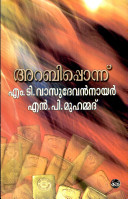 W
WArabi Ponnu is a Malayalam novel jointly written by M. T. Vasudevan Nair and N. P. Mohammed. The theme is the smuggling of gold from Arab countries, especially Arab states of the Persian Gulf, in its early period.
 W
WAsuravithu is a Malayalam novel written by M. T. Vasudevan Nair. Set in Kizhakkemuri, a fictional picturesque village in Kerala, the novel describes the plight of the protagonist Govindankutty, the youngest son of a proud Nair tharavadu, as he is trapped between the social scenario, social injustice and his own inner consciousness. As in many other M. T. novels, Asuravithu also has as its theme, the conflicts and problems of a Nair Family. The novel's English translation is titled The Demon Seed.
 W
WBalyakalasakhi, is a Malayalam romantic tragedy novel written by Vaikom Muhammad Basheer. Published in 1944, it is considered by many as Basheer's best work. The story revolves around Majeed and Suhra, who are in love with each other from childhood. By Basheer's own admission, the story is largely autobiographical.
 W
WBarsa is a 2007 Malayalam novel written by Khadija Mumtaz. The story deals with the haunting and agonising questions of Sabida, a devout and educated Muslim lady, a doctor, who spent six years in a hospital in Saudi Arabia. It won critical acclaim for its forceful but humorous presentation of the restrictions under which Muslim women are forced to live and was hailed a milestone in Malayalam literature. It won many awards including the Kerala Sahitya Akademi Award (2010), Cherukad Award (2010) and K. V. Surendranath Literary Award (2008). A Kannada translation of Barsa was released by the Karavali Lekhakiyara Vachakiyara Sangha in February 2012.
 W
WChemmeen is a Malayalam novel written by Thakazhi Sivasankara Pillai in 1956. Chemmeen tells the story of the relationship between Karuthamma, the daughter of a Hindu fisherman, and Pareekutti, the son of a Muslim fish wholesaler. The theme of the novel is a myth among the fishermen communities along the coastal Kerala State in the Southern India. The myth is about chastity. If the married fisher woman was adulterous when her husband was in the sea, the Sea Goddess would consume him. It is to perpetuate this myth that Thakazhi wrote this novel. It was adapted into a film of same name, which won critical acclaim and commercial success.
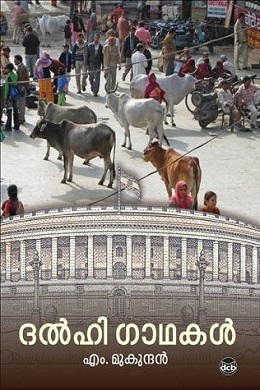 W
WDelhi Gadhakal is a Malayalam language novel by M. Mukundan. It was first published as a book by D. C. Books in November 2011. The novel portrays the various events that greatly influenced the author's life during the 40 years spent in New Delhi, since 1962. The novel has as protagonist a leftist Kerala youth, named Sahadevan, who had the shock of his life when he landed in Delhi to hear the news of Chinese attack on India.
 W
WFrancis Itty Cora is a bestselling mystery novel in Malayalam by author T. D. Ramakrishnan. The 2009 novel received considerable acclaims from critics for its unprecedented incorporation of many global historical characters and knowledge available to the present Malayalam readers for weaving the story line. Like The Journeyer the novel deals with the exploration of a merchant named Francis Itty Cora, hailing from the Kerala of 15th century. Among the historical characters include Vasco da Gama and Hypatia. The current global knowledge include Abu Ghraib torture and prisoner abuse and primacy of Kerala school of mathematics. Like The Da Vinci Code, this novel is of Christian background and tries to convince the reader an alternative possibility of what happened in the past in the Nazrani community of Malabar.
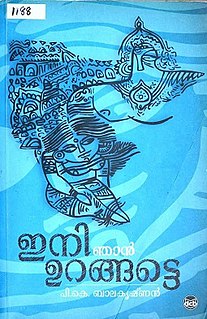 W
WIni Njan Urangatte is a Malayalam-language novel written by P. K. Balakrishnan in 1973. The novel's inspiration is the Sanskrit epic Mahabharata. It may be regarded as a historically notable Malayalam-language novel as it has become a yardstick for epic Malayalam fiction, spawning many Mahabharata based-novels.
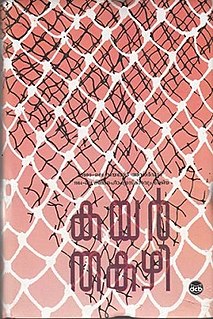 W
WKayar is a 1978 Malayalam epic novel written by Thakazhi Sivasankara Pillai. Widely considered one of the most seminal works in Malayalam literature, Kayar received many major literary awards, including the Jnanpith, India's highest literary honour.
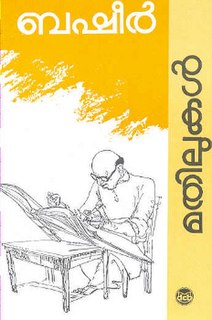 W
WMathilukal is a Malayalam novel written by Vaikom Muhammad Basheer in 1965. It is one of the most cherished and well-known love stories in Malayalam. Its hero, Basheer himself, and heroine, Narayani, never meet, yet they love each other passionately. Despite being imprisoned and separated by a huge wall that divides their prisons, the two romance each other.
 W
WMayyazhippuzhayude Theerangalil is a Malayalam language novel by M. Mukundan. Widely regarded as the author's magnum opus, the novel vividly describes the political and social background of Mahé (Mayyazhi), the former French colony, in the past, in a mystical way. The novel was translated into English and French, both the versions winning accolades.
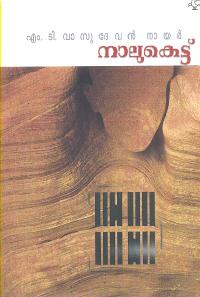 W
WNaalukettu is a Malayalam novel written by M. T. Vasudevan Nair. Published in 1958, it was MT's first major novel. The title attributes to Nālukettu, a traditional ancestral home (Taravad) of a Nair joint family. Like many other novels written by MT, Naalukettu is also set against the backdrop of the crumbling matrilineal order of Kerala in a newly independent India.
 W
WOru Theruvinte Katha is a Malayalam novel written by S. K. Pottekkatt and published in 1960. It sketches a host of characters who spend their lives making a living in ‘The Street’. However the central character can be discerned as Krishnakuruppu, who is mostly addressed as 'Kuruppu', 'Paper Kuruppu' and even 'Vishamasthithi' due to his usage of the phrase 'Kaaryam Vishamasthithi' or 'situation is difficult' in English when calling out headlines while selling news papers. Some of the minor characters are introduced to the reader through Kuruppu, where he is shown to be in conversation about them with other prominent characters of the street. The street is based on the S.M. Street or popularly known as Mithai theruvu in Kozhikode, Kerala. It won the Kerala Sahitya Academy Award of 1961.
 W
WPonni is a Malayalam novel written by Malayattoor Ramakrishnan in 1967. It is based on the lifestyle of Adivasis of Attappady at Malleswaram Hills of Mannarkkad.
 W
WSmarakasilaka is a Malayalam novel written by Punathil Kunjabdulla in 1977. The story of the novel is woven around a mosque and its surroundings. The key figure is Khan Bahadur Pookkoya Thangal of the rich Arakkal family whose character is a rare mixture of dignity, benevolence and insatiable lust.
 W
WUmmachu (Beloved) is a Malayalam novel written by Uroob in 1954. Ummachu along with Sundarikalum Sundaranmarum are considered the best works by Uroob and are ranked among the finest novels in Malayalam. In Ummachu, Uroob explores the ramifications of human relationships in a village.
 W
WVerukal is a Malayalam semi-autobiographical novel written by Malayattoor Ramakrishnan in 1966. It is widely credited as one of his best works. It won the Kerala Sahitya Akademi Award in 1967.
 W
WYakshi is a Malayalam novel written by Malayattoor Ramakrishnan in 1967. This novel is about a college lecturer, Srinivasan, who is disfigured in an accident in his college lab. He meets a beautiful woman who is willing to accept him despite his disfigurement. But after a while, Srinivasan has doubts about the identity of this woman; he doubts that this woman is human. The novel was adapted into a film with same name starring Sathyan in 1968. In 1993, Yakshi was shown in BBC's Off the Shelf program as 12 episodes. In 1995, Hema Malini directed a telefilm in Hindi for Zee TV titled Mohini with Sudesh Berry and Madhoo. In 2013, a contemporary retelling of the novel titled Akam was released.